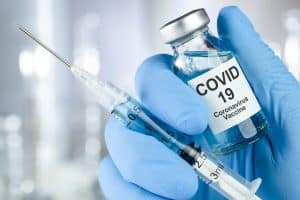Who Is Responsible if I Have an Allergic Reaction to the COVID-19 Vaccine?
 As the coronavirus pandemic continues into 2021, experts predict the spread of the virus will only slow once a vaccine is readily available and administered to the general population. As the vaccine rollout goes into effect throughout the United States, millions of citizens are in line for vaccination against the COVID-19 virus. The great majority of Americans will benefit from the vaccine – however, a small minority of patients may experience serious side effects or allergic reactions.
As the coronavirus pandemic continues into 2021, experts predict the spread of the virus will only slow once a vaccine is readily available and administered to the general population. As the vaccine rollout goes into effect throughout the United States, millions of citizens are in line for vaccination against the COVID-19 virus. The great majority of Americans will benefit from the vaccine – however, a small minority of patients may experience serious side effects or allergic reactions.
If you are in this minority, you may be wondering if you have any legal recourse. The answer to this question is quite complicated, but our attorneys can provide some insight.
Quick Questions
- What are common side effects from the COVID vaccine?
- Is it possible to be allergic to the COVID-19 vaccine?
- What if I have other types of allergies?
- Can I take legal action if I experience negative side effects from the vaccine?
- Is Covid-19 covered by the National Vaccine Injury Compensation Program?
What are common side effects from the COVID vaccine?
The Centers for Disease Control and Prevention (CDC) lists common side effects to expect after receiving a vaccination for COVID-19. Patients may experience the following normal reactions:
- Pain and/or swelling at the injection site
- Fever
- Chills
- Fatigue
- Headache
The CDC states that if you experience these symptoms for more than a few days, or if the injection site becomes inflamed or more painful after 24 hours, call your doctor or healthcare provider.
Is it possible to be allergic to the COVID-19 vaccine?
Although serious allergic reactions to the vaccine have been reported, they are rare. The CDC also provides recommendations for this event. The most common severe reaction to the vaccine is anaphylaxis. Typically this is treated immediately with epinephrine or an EpiPen©, or hospitalization in severe cases. Some patients also experience less serious reactions, like swelling, hives or wheezing.
If you have a reaction to the first dose of the mRNA COVID vaccine, the CDC advises you do not get the second dose.
What if I have other types of allergies?
If you have allergies that are unrelated to vaccines or medications, including “food, pet, venom, environmental, or latex allergies,” according to the CDC, you should still get a vaccination. If you have concerns, check with your doctor first.
However, they also state: “Polysorbate is not an ingredient in either mRNA COVID-19 vaccine but is closely related to PEG, which is in the vaccines. People who are allergic to PEG or polysorbate should not get an mRNA COVID-19 vaccine.”
Can I take legal action if I experience negative side effects from the vaccine?
This is where the law gets complicated. According to CNBC, the federal government provides pharmaceutical companies like Pfizer and Moderna blanket immunity from liability in the event something goes wrong with their vaccines. The Public Readiness and Preparedness Act (PREP) “empowers the HHS secretary to provide legal protection to companies making or distributing critical medical supplies, such as vaccines and treatments, unless there’s ‘willful misconduct’ by the company. The protection lasts until 2024.”
Is Covid-19 covered by the National Vaccine Injury Compensation Program?
Injurious COVID-19 reactions are not eligible for the National Vaccine Injury Compensation Program (NVICP). Instead, they are covered under the Countermeasures Injury Compensation Program (CICP). The CICP specifically handles claims related to any “vaccination, medication, device, or other item recommended to diagnose, prevent or treat a declared pandemic, epidemic or security threat.” Under the CICP, you only have one year to file a claim, which will be decided by the Secretary of Health and Human Services, and decisions cannot be appealed. In short, it is a much stricter program, and one that is far less likely to provide compensation.
Please contact Paulson & Nace, PLLC through this contact form or by calling 202-463-1999.
Related Articles
- mRNA Vaccines: Fact versus Fiction
- Confused by Vaccine Terminology? This Will Help
- Can the Measles Vaccine Protect Against COVID-19?
- How to Get Compensation for Vaccine Injuries and Adverse Immunization Reactions
- Medical Malpractice

Christopher T. Nace works in all practice areas of the firm, including medical malpractice, birth injury, drug and product liability, motor vehicle accidents, wrongful death, and other negligence and personal injury matters.
Read more about Christopher T. Nace.
